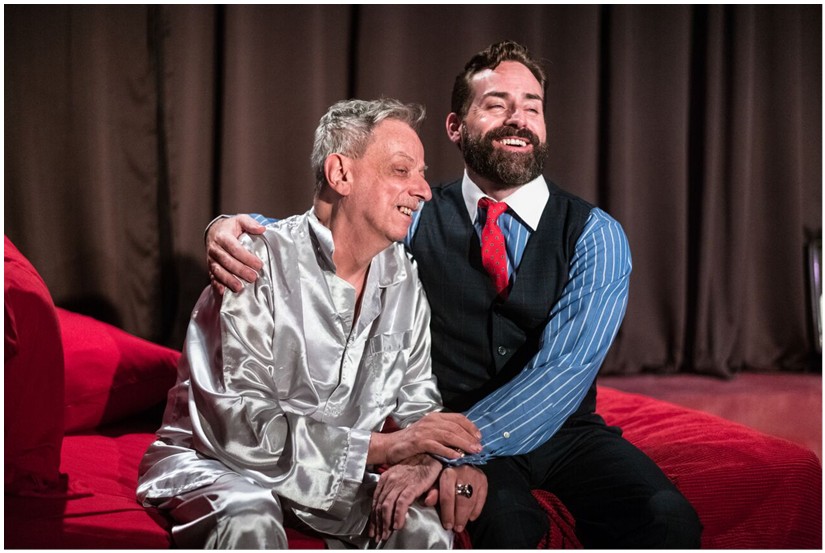
 HIGHLY RECOMMENDED**** Suddenly, Tennessee Williams seems to be the hottest playwright in Chicago. Last season saw a well-received production of one of his earliest works and later this season there will be two much-anticipated revivals of works at major theater companies as well as a new original work about his possible romantic relationship with fellow playwright William Inge in the spring. But Pride Films and Plays is the first out of the gate with its splendid and completely compelling production of “His Greatness.” Written by Canadian playwright Daniel MacIvor and billed as “a play inspired by the later years of Tennessee Williams’ life” this beautiful piece benefits greatly by the always reliable direction of David Zak and a solid cast of three actors. 4 SPOTLIGHTS
HIGHLY RECOMMENDED**** Suddenly, Tennessee Williams seems to be the hottest playwright in Chicago. Last season saw a well-received production of one of his earliest works and later this season there will be two much-anticipated revivals of works at major theater companies as well as a new original work about his possible romantic relationship with fellow playwright William Inge in the spring. But Pride Films and Plays is the first out of the gate with its splendid and completely compelling production of “His Greatness.” Written by Canadian playwright Daniel MacIvor and billed as “a play inspired by the later years of Tennessee Williams’ life” this beautiful piece benefits greatly by the always reliable direction of David Zak and a solid cast of three actors. 4 SPOTLIGHTS
Treating this as a speculative scenario of what might have actually happened in 1980, MacIvor opens the play as The Assistant (Andrew Kain Miller) walks on stage and addresses the audience directly, much like the character of Tom in “A Glass Menagerie,” which was Tennessee Williams’ first success. The Assistant tells us that this is his interpretation of what occurred so that, like any memory play, there is room for artistic license and one would be forgiving if details are somewhat murky. Not being a writer himself, The Assistant claims that he is not haunted by the voices that lurk in the mind of The Playwright (Danne W. Taylor), who we initially see slumbering in bed in his hotel room in Vancouver, buried under a pile of sheets and blankets in a darkened, confined room even though it is mid-afternoon. Waking with a severe hangover, his faithful Assistant must recount the details of the previous evening, which The Playwright has blacked out of his memory due to his heavy drug and alcohol consumption.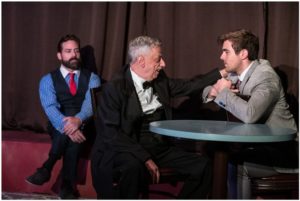
It turns out that The Playwright is in Vancouver for the opening of his latest play. (Tennessee Williams was actually a writer-in-residence at the University of British Columbia in 1980, and in October of that year, the Vancouver Playhouse produced his play “The Red Devil Battery Sign”). The Assistant has woken The Playwright to prepare him for a phone interview with a local critic, which does not go well. Julie (the voice-over of Kallie Rolison as if speaking on a speaker phone) asks The Playwright if this is really a new play or just a rehash of a work that bombed miserably in London the year before. She wants to know why The Playwright can’t write more “modern” plays for the theater, this being a common complaint during the 1960’s and 1970’s made by critics who didn’t like the new style that Tennessee Williams was utilizing in his writing. Clearly flustered and upset, The Playwright terminates the call mid-interview.
After all, this is the opening night of a new work by a celebrated and famous American playwright so there are more important things to worry about, like who is going to escort said playwright to the opening. Leave it to the hard-working Assistant to have that all arranged. He has hired a street hustler, The Young Man (Whitman Johnson) to escort The Playwright, even having to lend him his own suit to ensure that The Young Man be dressed respectably enough for the event. The first act ends as all three men depart to attend the opening night performance.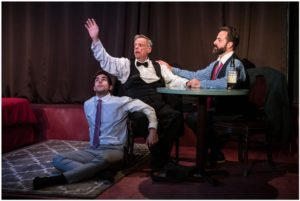
Act Two takes place the following morning, as the reviews have been published in the local newspapers and The Assistant assumes that The Young Man has gone. The Assistant hides the reviews from The Playwright and is shocked when The Young Man returns to the hotel room. It seems that The Playwright and The Young Man had quite a night of celebrating, didn’t get any sleep at all and The Young Man had to go out to purchase more cocaine for the two of them to enjoy. As alliances continue to shift and the patience of the long-suffering Assistant is put to an extreme test, Mr. MacIvor’s script shifts into very dark territory. Enamored with The Playwright’s fame and assumed wealth, The Young Man (who had never even heard of The Playwright before meeting him the previous evening) has convinced The Playwright that he is his new muse, that he should be on the payroll acting as his assistant and also the subject of his next play. The Playwright has agreed, forcing The Assistant (who has been employed for over a decade and also the sometimes lover of The Playwright) to resign.
The language of this play is so poetic it’s almost as if Tennessee Williams had written it himself. That’s major praise for Mr. MacIvor, whose play is filled with great humor as well as tragedy. The burden of fame, of loves lost and maybe found as well as the fear of losing one’s grip on their own mental well-being are masterfully interwoven in this exquisitely crafted play.
All three actors excel. Mr. Miller’s Assistant is physically adroit, proficient in manner and movement. He captures the shrewdness and anguish of someone who clearly loves his subject but is weary of all of the childish antics and erratic behavior. Mr. Johnson as The Young Man exhibits not only a flawlessly sculpted upper body but also makes this hayseed more than just an unsophisticated good time Charlie. He creates a genuine character, one that is quickly endearing and capable of creating a rift between the two older gentlemen as they vie for his affection. But it is Mr. Taylor as The Playwright who totally dominates the stage. With his impeccable Southern drawl and gentle manner of softly speaking when remembering minor details from his childhood he is the epitome of what one would imagine one would encounter upon meeting Tennessee Williams. He is charming, sly, irascible and tortured all in one being. Watch his eyes as he reads the terrible reviews published in the newspapers and you will see a whole range of emotions.
The play ends with The Assistant once again downstage and speaking directly to the audience while The Young Man and The Playwright are on opposite sides of the stage, dimly lit in a silhouette profile, telling us of the fates of these three characters. But in his concluding remarks he talks of the power and beauty of the theater and how an audience, sitting all alone out there in the dark, can be transformed and utterly moved by the entire experience. Thanks to “His Greatness” as well as the greatness and legacy of Thomas Lanier Williams III, you will be moved too.
“His Greatness runs through November 12th in the Buena, Pride Arts Center, 4147 N. Broadway, Chicago. Street parking is hard to find in this neighborhood. Your best bet is the metered lot at the corner of Belle Plaine and Clarendon.
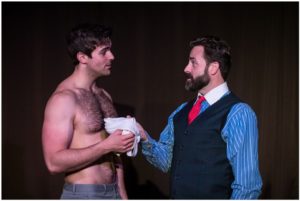 Running time is 90 minutes with an intermission.
Running time is 90 minutes with an intermission.
Performances are Thursdays through Saturdays at 7:30 pm and Sundays at 7:00 pm. There is a performance on 10/28 at 5 p.m. as well
Tickets are $25.
FYI (800) 737-0984 or www.pridefilmsandplays.com.
To see what others are saying, visit www.theatreinchicago.com, go to Review Round-Up and click at “His Greatness”



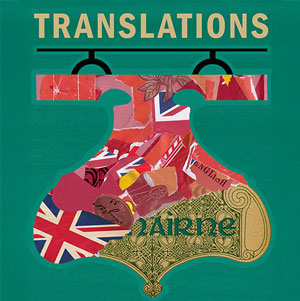


More Stories
“Translations”
“The Firebugs” reviewed by Julia W. Rath
“The Book of Grace” Al Bresloff with another from Paul LIsnek